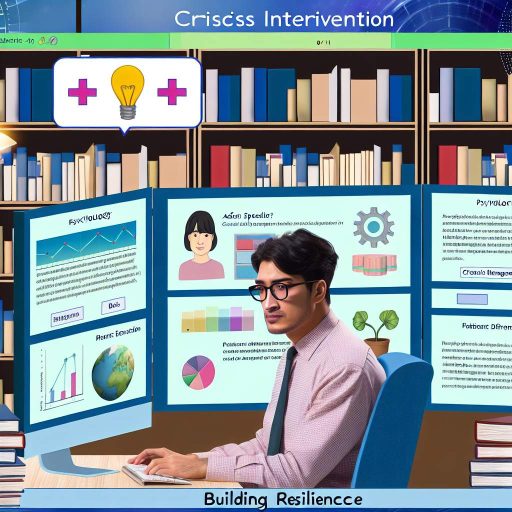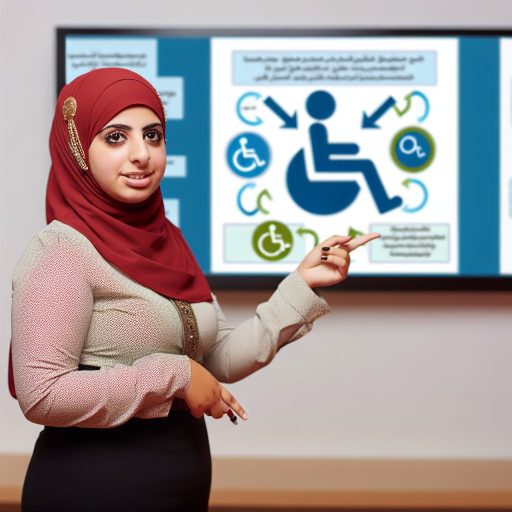Introduction:
Defining Rehabilitation Counseling
Rehabilitation counseling involves assisting individuals with disabilities to achieve personal, social, and vocational goals.
Role in Addressing Mental Health Issues
Rehabilitation counselors play a crucial role in addressing mental health issues by providing support and guidance.
Importance of Mental Health Awareness and Treatment
It is essential to raise awareness about mental health issues and ensure access to proper treatment and support.
Preview of Key Points
This blog post will explore the role of rehabilitation counseling in addressing mental health issues, the importance of mental health awareness, and the key strategies for providing effective support to individuals with disabilities.
Overview of Rehabilitation Counseling:
Rehabilitation counseling is a specialized field that aims to help individuals with disabilities, including mental health challenges, achieve optimal functioning and independence.
It involves providing support and guidance to clients as they navigate the challenges associated with their conditions.
Concept of Rehabilitation Counseling:
- Rehabilitation counseling focuses on assisting individuals in overcoming barriers to personal and vocational success.
- It encompasses a holistic approach that addresses the physical, emotional, social, and vocational aspects of an individual’s life.
- The ultimate goal of rehabilitation counseling is to empower clients to lead fulfilling and meaningful lives despite their disabilities.
Role of Rehabilitation Counselors:
- Rehabilitation counselors serve as advocates for clients, helping them access necessary resources and support services.
- They conduct assessments to identify clients’ strengths and limitations, as well as specific areas where they may need assistance.
- Rehabilitation counselors develop individualized treatment plans and provide counseling to address clients’ mental health challenges.
Examples of Mental Health Issues Addressed:
- Depression: Rehabilitation counselors work with clients to explore coping strategies and treatment modalities to manage symptoms of depression.
- Anxiety disorders: Counselors help clients develop relaxation techniques and cognitive-behavioral interventions to reduce anxiety symptoms.
- Post-traumatic stress disorder (PTSD): Rehabilitation counselors support clients in processing trauma and developing healthy ways to cope with triggers.
Rehabilitation counseling plays a vital role in supporting individuals with mental health challenges in achieving their goals and improving their overall quality of life.
By providing tailored interventions and support, rehabilitation counselors empower clients to overcome barriers and thrive despite their disabilities.
Importance of Mental Health Awareness
Raising awareness about mental health is crucial in today’s society.
It helps to reduce stigma and promote understanding of mental health issues.
- Increased Awareness: By educating the public about mental health, more people can recognize symptoms and seek help.
- Reducing Stigma: Addressing mental health openly can break down stereotypes and discrimination against those with mental illnesses.
- Early Intervention: Awareness leads to early detection of mental health issues, allowing for timely intervention and treatment.
- Promoting Support: Awareness campaigns create a supportive environment for individuals struggling with mental health challenges.
Mental health issues not only affect individuals but also have a significant impact on families and society as a whole.
It is crucial to address these issues to improve overall well-being.
- Individual Impact: Mental health problems can impair daily functioning, relationships, and overall quality of life for individuals.
- Family Impact: Families of individuals with mental health issues may experience stress, financial burdens, and emotional strain.
- Societal Impact: Mental health issues contribute to productivity loss, increased healthcare costs, and social challenges in communities.
Statistics and data further highlight the importance of addressing mental health.
Research shows the prevalence and impact of mental health issues on various aspects of life.
- Global Statistics: According to the World Health Organization, 1 in 4 people worldwide will experience a mental health condition at some point in their lives.
- Economic Impact: Mental health issues cost the global economy over $1 trillion in lost productivity each year.
- Social Costs: Mental health problems contribute to increased rates of homelessness, substance abuse, and criminal justice involvement.
Uncover the Details: Role and Duties of a Community Health Worker Explained
Common Mental Health Challenges
Depression is characterized by feelings of sadness, hopelessness, and lack of motivation.
Anxiety involves constant worry, fear, and difficulty coping with stress.
Bipolar disorder features intense mood swings from highs to lows.
PTSD is marked by flashbacks, nightmares, and severe anxiety after a traumatic event.
These challenges can significantly impact daily functioning and overall well-being.
Transform Your Career Today
Unlock a personalized career strategy that drives real results. Get tailored advice and a roadmap designed just for you.
Start NowIndividuals may struggle to maintain relationships, perform at work or school, and take care of themselves properly.
The stigma surrounding mental health can also worsen these challenges, making it difficult for individuals to seek help.
Impact of Mental Health Challenges
- Social isolation may occur due to withdrawal from friends and family affected by depression or anxiety.
- Physical health issues arise from increased risk of heart disease, obesity, and other health problems.
- Impaired cognitive function includes difficulty concentrating, making decisions, and remembering things.
- Substance abuse can happen when individuals use drugs or alcohol to cope with mental health symptoms.
These challenges can lead to a decrease in the quality of life.
If left untreated, they may contribute to a cycle of worsening mental health symptoms.
Rehabilitation Counseling for Mental Health
Rehabilitation counseling offers a holistic approach to help individuals cope with and overcome mental health challenges.
This type of counseling focuses on the individual’s strengths and abilities, rather than just their limitations.
Here are some ways in which rehabilitation counseling can help individuals facing mental health challenges:
Individualized Treatment Plans
Rehabilitation counselors work with individuals to create personalized treatment plans that address their unique needs and goals.
This may include therapy, medication management, and lifestyle changes to improve overall well-being.
Skill Development and Training
Rehabilitation counseling helps individuals develop coping skills, problem-solving abilities, and communication strategies.
These skills can empower individuals to navigate challenges more effectively.
Vocational Support
Rehabilitation counselors assist individuals in exploring career options, setting goals, and developing job skills.
This support can enhance their employability and help them maintain employment or re-enter the workforce.
Peer Support and Networking
Rehabilitation counselors may connect individuals with peer support groups or community resources.
This can help them build a support system and connect with others who understand their experiences.
Advocacy and Empowerment
Rehabilitation counselors advocate for individuals’ rights and empower them to advocate for themselves.
This can increase individuals’ self-confidence and ability to assert their needs.
Uncover the Details: Role of Technology in Community Health Worker Efficiency
Role of Rehabilitation Counselors:
Rehabilitation counselors play a crucial role in helping individuals with mental health issues to regain independence.
They assess clients’ needs, develop treatment plans, and provide guidance and support throughout the rehabilitation process.
Transform Your Career Today
Unlock a personalized career strategy that drives real results. Get tailored advice and a roadmap designed just for you.
Start NowRehabilitation counselors use a variety of therapeutic techniques and approaches to help clients address their mental health challenges.
These may include cognitive-behavioral therapy, mindfulness-based therapy, solution-focused therapy, and psychodynamic therapy.
- Building strong relationships with clients is essential in rehabilitation counseling as it fosters trust.
- Open communication and collaboration allow counselors to better understand clients’ needs.
- This understanding leads to more effective treatment outcomes.
Find Out More: Impact of Case Managers on Community Well-being
Rehabilitation counseling techniques play a crucial role in addressing mental health issues.
These techniques are used by professionals to help individuals cope with their conditions and improve their overall well-being.
Importance of Individualized Treatment Plans
When it comes to clients with mental health issues, it is essential to create individualized treatment plans.
These plans take into account the unique needs, preferences, and challenges of each client.
This ensures that they receive personalized care that is tailored to their specific situation.
By creating individualized treatment plans, rehabilitation counselors can address the root causes of a client’s mental health issues.
They can develop strategies to help them overcome their challenges.
This personalized approach allows counselors to focus on the specific needs of each client.
It leads to more effective treatment outcomes.
Successful Rehabilitation Counseling Interventions
- Cognitive Behavioral Therapy (CBT): CBT is a widely used technique in rehabilitation counseling that helps clients identify and change negative thought patterns and behaviors.
- Motivational Interviewing: This technique focuses on helping clients explore their own motivations for change and set goals for themselves.
- Mindfulness-Based Stress Reduction (MBSR): MBSR is a technique that combines mindfulness meditation with cognitive-behavioral therapy to help clients manage stress, anxiety, and other mental health issues.
These examples demonstrate the effectiveness of rehabilitation counseling interventions in addressing mental health issues and helping clients achieve positive outcomes.
By using a combination of techniques tailored to the individual needs of each client, rehabilitation counselors can make a significant impact on their clients’ lives.
This empowers them to overcome their challenges.
Explore Further: Understanding the Role of a Child Welfare Specialist

Addressing Mental Health in Rehabilitation Counseling
When it comes to addressing mental health in rehabilitation counseling, there are several challenges that counselors may encounter.
It is important to be aware of these challenges and have strategies in place to overcome them in order to provide effective counseling.
Identifying Common Challenges
- Stigma: Mental health issues are still often stigmatized, which can make it difficult for clients to seek help.
- Communication barriers: Some clients may have trouble expressing their thoughts and emotions, making it challenging for counselors to understand their needs.
- Complex diagnoses: Clients may have multiple mental health diagnoses that require specialized treatment and care.
- Resistance to change: Some clients may be resistant to making necessary changes to improve their mental health.
Strategies for Overcoming Challenges
- Education: Providing clients with information about mental health can help reduce stigma and increase understanding.
- Active listening: Counselors need to actively listen to their clients to better understand their needs and concerns.
- Collaboration: Working closely with other healthcare professionals can help provide comprehensive care for clients with complex diagnoses.
- Empathy: Showing empathy and understanding towards clients can help build trust and rapport, making it easier for them to open up.
- Goal setting: Collaborating with clients to set achievable goals can help motivate them to make positive changes in their lives.
Importance of Self-Care and Professional Development
Self-care is crucial for rehabilitation counselors who are addressing mental health issues.
Working in this field can be emotionally demanding, so counselors need to prioritize their own well-being in order to provide effective care to their clients.
Transform Your Career Today
Unlock a personalized career strategy that drives real results. Get tailored advice and a roadmap designed just for you.
Start Now- Regular supervision: Participating in supervision sessions with experienced counselors can provide support and guidance for challenging cases.
- Continuous learning: Staying updated on the latest research and treatment methods is essential for providing high-quality care to clients.
- Personal therapy: Seeking therapy for yourself can help you process the emotional toll of working with clients with mental health issues.
- Work-life balance: Setting boundaries between work and personal life is important to prevent burnout and maintain a healthy lifestyle.
Rehabilitation counseling is a rewarding but challenging field, especially when addressing mental health issues.
By being aware of common challenges, having strategies in place to overcome them, and prioritizing self-care and professional development, counselors can provide effective and compassionate care to their clients.
Benefits of Rehabilitation Counseling:
Rehabilitation counseling can lead to improved mental health outcomes for individuals facing challenges.
It provides support, guidance, and tools to help clients navigate their mental health difficulties effectively.
Rehabilitation counseling focuses on promoting independence and empowerment in clients, allowing them to regain control of their lives.
By empowering clients, rehabilitation counseling helps them develop coping strategies to manage their mental health issues.
It assists individuals in setting goals and working towards achieving them, fostering a sense of accomplishment and purpose.
Through rehabilitation counseling, clients learn valuable skills to enhance their social interactions and relationships.
It can also help improve self-esteem and self-confidence, leading to a more positive outlook on life.
Rehabilitation counseling offers a safe space for individuals to explore their thoughts, feelings, and fears without judgment.
Real-Life Success Stories:
One success story involves a client who struggled with severe anxiety and depression.
Through rehabilitation counseling, she learned effective coping mechanisms and regained her confidence.
She was able to return to work and live a fulfilling life.
Another client, who faced challenges related to post-traumatic stress disorder, found healing and resilience through rehabilitation counseling.
He was able to address his trauma, improve his mental health, and rebuild his relationships with loved ones.
These success stories exemplify the transformative power of rehabilitation counseling in supporting individuals with mental health challenges.
By promoting independence and empowerment, this form of counseling can make a significant difference in the lives of those who seek help.
Importance of Rehabilitation Counseling
Rehabilitation counseling plays a crucial role in addressing mental health issues.
It provides support, guidance, and resources to individuals.
This helps them overcome challenges and improve their overall well-being.
Transform Your Career Today
Unlock a personalized career strategy that drives real results. Get tailored advice and a roadmap designed just for you.
Start NowRecognizing the significance of rehabilitation counseling is vital in the mental health field.
Advocating for its continued support and development is essential.
By investing in these services, we enhance the quality of life for those struggling with mental health challenges.
I encourage readers to seek help if they face mental health challenges.
Reaching out to professionals in rehabilitation counseling can provide the necessary assistance.
This support can guide individuals through their mental health journey successfully.
Additional Resources
Mental Health and Social Work Practice
Comprehensive Rehabilitation Services (CRS) | Texas Health and …
[E-Books for Sale]
The Big Book of 500 High-Paying Jobs in America: Unlock Your Earning Potential
$19.99 • 500 High-Paying Jobs • 330 pages
Explore 500 high-paying jobs in America and learn how to boost your career, earn more, and achieve success!
See All 500 High-Paying Jobs of this E-Book
1001 Professions Without a Degree: High-Paying American Jobs You Can Start Now
$19.99 • 1001 Professions Without a Degree • 174 pages
Discover 1001 high-paying jobs without a degree! Unlock career tips, skills, and success strategies for just $19.99!




